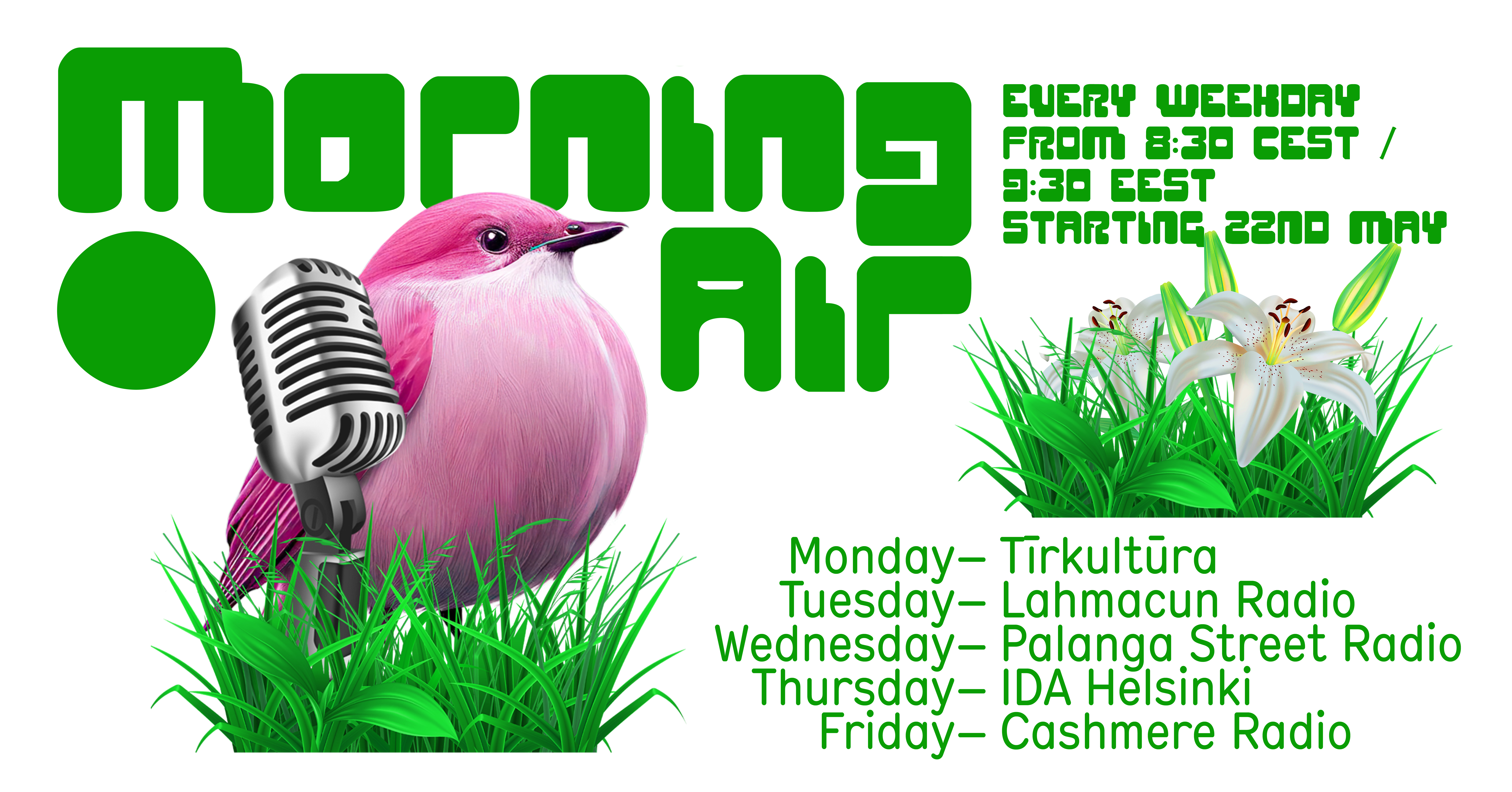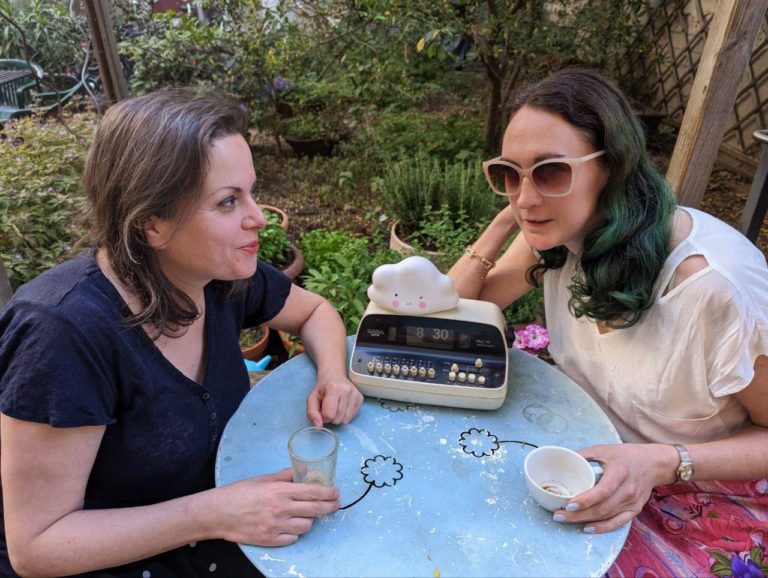Author: Ieva Gudaitytė
The Independent Community Radio Network, which brings together community radios at the European level, launched the “Morning Air” initiative in May 2023. Over the course of a month, morning shows were broadcast live from Berlin, Vilnius, Riga, Budapest, and Helsinki. Each day, a different local community radio took over the broadcast, offering unique local experiences for breakfast from their respective European countries.

Soundscapes disappearing from our routines: morning programmes set as alarm clocks, commutes accompanied by a favourite station, evening news jingles closing off the working day. Radio, as a marker of our times but also our everydays, requires reimagining. Outside the mainstream radio (a loyal companion of modernity and its twisted historic routes), another kind of live programming is offered by independent community radio scenes. A breakfast show; a moment of symbolic reconnection: a sonic ritual to tune in and be greeted by familiar voices across Europe, to start the day off well – with “good morning, Berlin; good morning, Vilnius; good morning, Riga; good morning, Helsinki; good morning, Budapest”.
Network as a cultural practice
Early last summer, five community radios came together to share the most important meal of the day, live on online radio. The “Morning Air” project, initiated by the Independent Community Radio Network (later, ICRN) and funded by Nordisk Kulturfond, allowed listeners to tune in to a different broadcast each workday morning for a month from the end of May: Mondays from Tīrkultūra in Riga; Tuesdays Lahmacun Radio in Budapest; Wednesdays, Palanga Street Radio in Vilnius; Thursdays, IDA Helsinki; and Fridays from Cashmere Radio in Berlin. It offered a daily one and a half hours of light conversation or intriguing interviews, smooth tunes, narrated cooking, bell sounds, immersive underwater soundscapes, jokes, and a sense of starting the day together–as the project description indicates, a variety of opportunities to “enjoy a fresh breeze of Morning Air” (icrn.live, 2023). Apart from Cashmere, broadcasting on FM waves in Berlin and Potsdam every Friday, the rest were streamed online, across the websites of participating stations; and now available on their digital archives or SoundCloud.
This is one out of many initiatives developed by ICRN[1], a two-year-old collective of small-scale autonomous radio stations. Aiming to develop sustainable ways of “building local and trans-local communities; maintaining independence and cooperation as an essential tool to empower our future(s)” (icrn.live, 2022) through alternative broadcasting, ICRN mobilises efforts to support and develop alternative radiophonic culture scenes across Eastern–Northern Europe. So far, this communal work has resulted in various studio visits, shared broadcasts, and further plans. The metaphoric freshness of doing a breakfast show together thus comes as a natural continuation of other grounding practices: for the hosts, a tool against the fleeting precarity of the culture work industry, and a sense of ease and intimacy for the listeners. To tune in and hear an improvised dream reading, or perhaps a laid-back stroll across the park on an early summer morning is a start of a good day–a sonic anchor within a constantly moving globalised world.

The team of Riga-based Tīrkultūra sharing the live nutritious sounds of cooking up a healthy breakfast.
Rethinking the radio host
More than a pleasant soundtrack to the daily public transport ride, breakfast show also brings the role of a radio host back to the daily schedule. Reminder of the importance of human curation: in a form of an expert listener offering an alternative to our familiar patterns, a funny friend having a feel-good-banter by your side, or an experimental artist exploring the boundaries of radio formats. In the genre as easily recognisable as the breakfast show, host figure resurfaces with new possibilities for open and playful radio. At the time where community media still navigates the ambiguous grey zone between music, arts, and media, a program like that can be a key for long time listeners, hosts, and broader audiences to get to know each other better. Something that makes online radio “more like a radio” due to its liveness, direct host interaction, balance between music and talk, and consistency and experiment.
This raises the question of reciprocity: both with the listeners and amongst a rather diverse set of cities. Without going into the depths of how we perceive “live air” media, it is important to highlight the interactive function of a chat within community broadcast culture. Usually operating on the station’s home page, sometimes exported on other social media platforms like Discord or Telegram, an online conversation platform reminds of the late 90s/early 00s internet forum cultures, often living a life on its own. For most stations, it balances between being a friendly and welcoming, and somewhat exclusive space for private jokes. That might not be a bad thing at all, considering the size and closeness of such communities, yet it is peculiar to see these digital spaces opening on collaborations like “Morning Air”. A parallel hosting dimension: for regular listeners to migrate across stations, greet and be greeted by fellow radio members, share a breakfast recipe, or suggest a tune–a regular virtual meeting spot for alternative local music fans.

Cashmere Radio’s Shelley, Elli and guests serve a buffet breakfast of treats to get you to your morning destination. With alarms, wake-up calls, phone-ins, tunes, trivia, scandals and more.
Bringing shared contexts to the table
Breakfast is a homely, often private, almost intimate act; and radio responds to its inherent familiarity in various ways. Some stations, like Cashmere, explore a live call-in function, an excellent example of ways alternative radio breaks down social anonymity. Yet even without it, the broadcasts offer their situated specificity as a celebration of translocal values foundational for the network. While all episodes are predominantly in English–except the first two bilingual Hungarian-English episodes from Lahmacun–radios find other ways to exhibit their respective contexts: by showcasing local artists, talking about local foods, histories, and other cultural references. Whether it’s a special shout-out to the city of Vilnius on its 700th birthday or a fun fact that Hungarian and Estonian share the same word for a plastic swimming mattress (“I wonder how the interaction went when people from these two nations found this initially” (Morning Air #12 With Reggeli Levegő Gerivel, 2023)), language and place are important. Without escaping the cliché of building radio bridges, a shared breakfast show became an organic way to reflect on the zeitgeist across alternative music scenes in Europe, create mutual jokes, ironize shared problems–do simple things like making breakfast together, yet on air.
If bridge may be a cliché, making sustainable collegial friendships in this context isn’t. It is a real tool for a more democratic and pluralistic cultural scene, a remedy against the fatigue from grandiose populist news culture, a way for slower ways to listen in daily life. As radio researcher Jody Berland writes, “radio is humble and friendly, it follows you everywhere” (Berland, 1990, p. 180). Why not to the start of the new day–like a friendly voice coming out of the breakfast kitchen and joining you further into the busy city streets. A voice that enjoys being there: by a unanimous consent from all participants, “Morning Air” is surely coming back, so keep an ear out for its fresh breeze.
[1] More about ICRN on their website, or here.
Published on April 19th, 2024
About the author:
Ieva Gudaitytė researches, writes, and hosts occasional radio shows on various independent community radio stations. She is currently a PhD candidate at the University of Oslo with a focus on Ukrainian independent radio and music scene and its Eastern European networks.